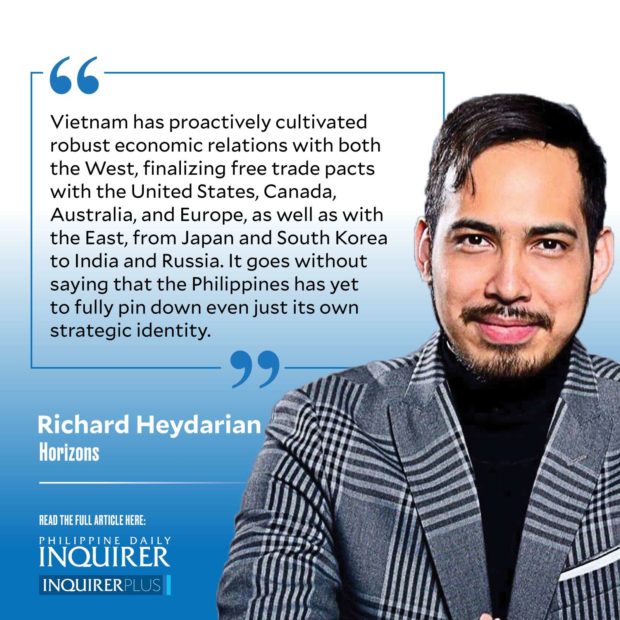What we can learn from Vietnam
A millennium from now, historians would likely identify the rise of China as one of the most consequential events of the 21st century. In just over half a century, the Middle Kingdom went from one of the most impoverished nations on earth, ranking well below even Sub-Saharan African countries in per capita income, into one of the largest sources of development assistance in the world.
Although on a humbler scale, Vietnam’s rapid ascent is no less impressive. Visiting the Southeast Asian country over the past decade, I have witnessed how Vietnam transformed in every single dimension of collective life. Whereas scooters used to dominate the roads, now German cars, sport utility vehicles, and locally made cars have become ubiquitous in Hanoi and Saigon. What’s particularly noteworthy is the sheer number and elegant design of cars by the VinFast automotive company, which was established only in 2017 by local billionaire Pham Nhat Vuong.
Earlier this year, the Vietnamese company announced that it would set up a $4 billion factory complex in North Carolina to produce, inter alia, even electric vehicles. Facing uncertainty in China amid a brewing New Cold War with the West, global tech giants are doubling down on Vietnam. Recently, Apple announced that Macbook and Apple Watch products would be manufactured, via Luxshare Precision Industry and Foxconn in Vietnam for the first time in history.
Today, almost every branded product, from fashion (Armani Exchange) and sports (Adidas) to electronics (Samsung), carries the “Made in Vietnam” tag. For a country that grappled with decades of devastating warfare throughout the latter half of the 20th century, this is nothing short of transformational.
It goes without saying that I’m no fan of single-party authoritarian regimes, but today’s Vietnam is an economic dynamo that offers helpful lessons for peers such as the Philippines. For the purposes of this short article, let me, dear reader, just focus on three major themes.
The first, and arguably most important, lesson from Vietnam is their emphasis on basic education, especially in math and sciences. Although still a relatively poor country, Vietnam ranked eighth in the world when it was first included in the prestigious Programme for International Student Assessment (Pisa) by the Paris-based Organisation for Economic Co-operation and Development. It means that average students in the Southeast Asian country beat the bulk of rich-nation counterparts in terms of basic proficiency in math and sciences, as well as in reading comprehension.
The neighboring Philippines, which has had a higher per capita income than Vietnam until recently, ranked at the bottom of Pisa. In the World Bank’s recent report on “learning poverty,” which assesses difficulties in reading comprehension among elementary students, Vietnam’s numbers (18 percent) were incomparable to the Philippines (91 percent).
The second lesson from Vietnam is their optimal mix of agricultural and industrial development. Instead of excessively relying on the services sector as in India and the Philippines, or extractive industries as in Indonesia, Vietnam has simultaneously become an agricultural and manufacturing powerhouse.
Thanks to its proactive trade, industrial, and agricultural policies, the Southeast Asian country has become among the largest exporters of staple foods, such as rice, as well as high-value-added electronics. Its export-oriented economy even managed to post economic growth in 2020, the same year that the Philippine economy suffered an almost double-digit contraction, among the worst in Asia.
Vietnam’s effective population management programs and diversified economy also explains relatively low incidents of poverty and hunger compared to its peers such as the Philippines. Though still seemingly rustic, Vietnam’s major cities are also bereft of mind-boggling inequalities, which are fully on display in the large slums of Manila, Jakarta, and Bangkok.
The third lesson from Vietnam is its unique approach to the outside world. On one hand, the Southeast Asian country has “globalized” and opened up itself to the world under the Doi Moi (restoration) economic reforms without compromising its authentic social values, vibrant food culture, and distinct architecture.
Moreover, Vietnam has proactively cultivated robust economic relations with both the West, finalizing free trade pacts with the United States, Canada, Australia, and Europe, as well as with the East, from Japan and South Korea to India and Russia. It goes without saying that the Philippines has yet to fully pin down even just its own strategic identity.
rheydarian@inquirer.com.ph





















